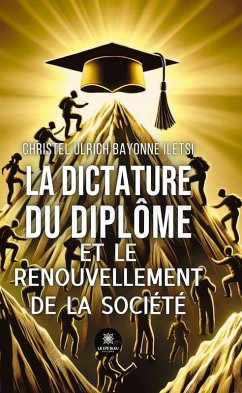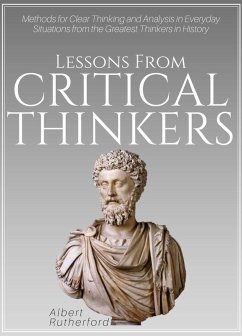
The Seven Laws of Teaching (eBook, ePUB)

PAYBACK Punkte
0 °P sammeln!
This is a clear and simple statement of the important factors governing the art of teaching. It has been used with great success as a handbook for teachers in the church school. Its reprint is the result of the strong demand for this book for this purpose, as well as for textbook use for those who are preparing for religious teaching.Dr. John Milton Gregory was a Baptist minister and educator. Among the educational positions which he held during his long and useful lifetime were: head of the classical school in Detroit, Michigan; Michigan State Superintendent of Public Instruction; President o...
This is a clear and simple statement of the important factors governing the art of teaching. It has been used with great success as a handbook for teachers in the church school. Its reprint is the result of the strong demand for this book for this purpose, as well as for textbook use for those who are preparing for religious teaching.
Dr. John Milton Gregory was a Baptist minister and educator. Among the educational positions which he held during his long and useful lifetime were: head of the classical school in Detroit, Michigan; Michigan State Superintendent of Public Instruction; President of Kalamazoo College; President of the University of Illinois. The revisers of Gregory's book on teaching, Dr. Bagley and Layton, were teachers in the School of Education of the University of Illinois.
The author of this book, John Milton Gregory, was one of the educational leaders of the generation that has just passed from the stage. He was born at Sand Lake, in Rensselaer County, New York, on July 6th, 1822. His early training was obtained in the district schools and he became himself a district-school teacher at the age of seventeen. Three years later, apparently destined for the profession of law, he entered Union College at Schenectady, New York, but after graduating in 1846, he gave up the study of law to enter the ministry of the Baptist Church. His heart, however, was in teaching, and in 1852 he became head of a classical school in Detroit, Michigan. Almost immediately he was recognized as a leader in the educational councils of the state. He was active in the affairs of the State Teachers' Association and was one of the founders and the first editor of the "Michigan Journal of Education." His intimate knowledge of educational affairs and his popularity among the teachers led to his election in 1858 to the State superintendency of public instruction, an office to which he was twice reelected. He declined a fourth nomination in 1864 when, as president of Kalamazoo College, he entered upon a new phase of his career-the organization of institutions for higher education.
In 1868, when the University of Illinois was established under the name, "Illinois State Industrial University," Dr. Gregory was asked to undertake the organization of the new institution. His work for thirteen years in laying the foundation of one of the largest and strongest of the state universities gives him a secure place in the history of American education. After leaving the University of Illinois he served for some time as a member of the United States Civil Service Commission. The great work of his life, however, was the organization of the University, and just before he died in 1898 he asked that his body be laid to rest within the campus of the school for which he had done so much. This request was reverently complied with.
Dr. Gregory's book, "The Seven Laws of Teaching," was first published it 1884. A clear and simple statement of the important factors governing the art of teaching, it has been especially successful as a handbook for Sunday school teachers. In recognition of Dr. Gregory's great service to the University of Illinois, two members of the School of Education undertook the revision of the book which is here presented.
CrossReach Publications
Dr. John Milton Gregory was a Baptist minister and educator. Among the educational positions which he held during his long and useful lifetime were: head of the classical school in Detroit, Michigan; Michigan State Superintendent of Public Instruction; President of Kalamazoo College; President of the University of Illinois. The revisers of Gregory's book on teaching, Dr. Bagley and Layton, were teachers in the School of Education of the University of Illinois.
The author of this book, John Milton Gregory, was one of the educational leaders of the generation that has just passed from the stage. He was born at Sand Lake, in Rensselaer County, New York, on July 6th, 1822. His early training was obtained in the district schools and he became himself a district-school teacher at the age of seventeen. Three years later, apparently destined for the profession of law, he entered Union College at Schenectady, New York, but after graduating in 1846, he gave up the study of law to enter the ministry of the Baptist Church. His heart, however, was in teaching, and in 1852 he became head of a classical school in Detroit, Michigan. Almost immediately he was recognized as a leader in the educational councils of the state. He was active in the affairs of the State Teachers' Association and was one of the founders and the first editor of the "Michigan Journal of Education." His intimate knowledge of educational affairs and his popularity among the teachers led to his election in 1858 to the State superintendency of public instruction, an office to which he was twice reelected. He declined a fourth nomination in 1864 when, as president of Kalamazoo College, he entered upon a new phase of his career-the organization of institutions for higher education.
In 1868, when the University of Illinois was established under the name, "Illinois State Industrial University," Dr. Gregory was asked to undertake the organization of the new institution. His work for thirteen years in laying the foundation of one of the largest and strongest of the state universities gives him a secure place in the history of American education. After leaving the University of Illinois he served for some time as a member of the United States Civil Service Commission. The great work of his life, however, was the organization of the University, and just before he died in 1898 he asked that his body be laid to rest within the campus of the school for which he had done so much. This request was reverently complied with.
Dr. Gregory's book, "The Seven Laws of Teaching," was first published it 1884. A clear and simple statement of the important factors governing the art of teaching, it has been especially successful as a handbook for Sunday school teachers. In recognition of Dr. Gregory's great service to the University of Illinois, two members of the School of Education undertook the revision of the book which is here presented.
CrossReach Publications
Dieser Download kann aus rechtlichen Gründen nur mit Rechnungsadresse in A, B, BG, CY, CZ, D, DK, EW, E, FIN, F, GR, H, IRL, I, LT, L, LR, M, NL, PL, P, R, S, SLO, SK ausgeliefert werden.













